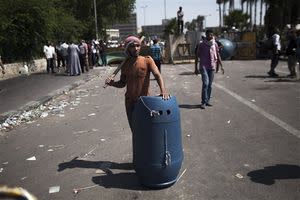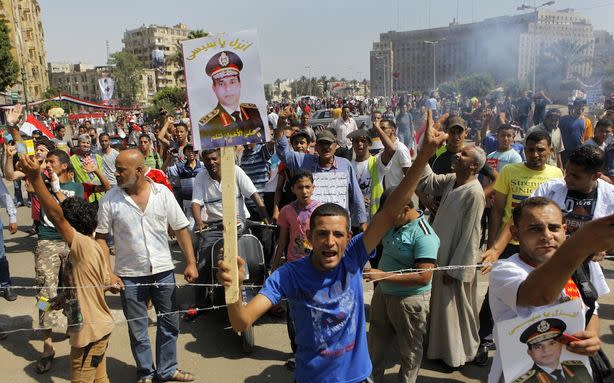Islamists Are So Over Democracy After the Egyptian Coup
Many Islamists have never been that into democracy to begin with, and now that the Muslim Brotherhood's Mohammed Morsi has been ousted from the Egyptian presidency in what they insist is a military coup, they're done with it. "No more election after today," an Islamist crowd chanted under a black jihadi flag in the Egyptian Sinai after the coup, The New York Times's David D. Kirkpatrick and Ben Hubbard report. In interview after interview, the Islamists show they have no patience for elections, having won power and then getting stripped of it within a year. (Why not chant "No more coups"?) Sheik Abu Sidra, an ultraconservative Islamist in Benghazi, told the Times that the coup makes pitching democracy much harder: "Do you think I can sell that to the people anymore? ... I have been saying all along, 'If you want to build Shariah law, come to elections.' Now they will just say, 'Look at Egypt,' and you don't need to say anything else."
RELATED: The Muslim Brotherhood Calls for a 'Day of Rejection' in Egypt
The Muslim Brotherhood held a "day of rejection" on Friday to protest the ousting of the country's first democratically elected president. The protests were supposed to be peaceful, but shots were fired outside the Republican Guard headquarters by 3:30 p.m. local time, The Washington Post reports. At least one person was reportedly killed. Al Jazeera reports that helicopters flew low over a pro-Morsi crowd in Cairo, and tear gas was used. Independent reporter Sharif Kouddous tweeted photos of what looked like a dead body, wrapped in a shroud, being carried by protesters. An Egyptian army spokesman said the military used blank rounds and tear gas, not live rounds, on protesters. A BBC reporter was hit in the head with birdshot. (At left, a man with a Morsi helmet, via Al Jazeera.)
RELATED: The Egyptian Outrage Peddler Who Sent an Anti-Islam YouTube Clip Viral
Though Morsi had been able to win the support of enough voters to get elected, he was not able to win support much of anywhere else. "In recent months, Morsi had been at odds with virtually every institution in the country, including the top Muslim and Christian clerics, the judiciary, the armed forces, the police and intelligence agencies," the Associated Press reports. When his hold on power was slipping, he had no one to turn to — and eventually nowhere. That went for outside of his country, too. Arab leaders in Saudi Arabia, Syria, Jordan, the United Arab Emirates, and Qatar all congratulated Egypt on getting rid of Morsi. Jordanian Foreign Minister Nasser Judeh said young Egyptians had brought "intellectual and moral credit to the Arab nation," The Washington Post's Liz Sly and Ruth Eglash report. There are few elected leaders in the Middle East, which might explain why those leaders were less ambivalent about the coup than President Obama, who could not call it a coup.
RELATED: Tahrir Square Erupts in Cheers as Morsi Is Removed from Office
In meetings with Egypt's prime minister and Gen. Abdel-Fattah el-Sissi before he stepped down, Morsi repeatedly pointed out that he won the June 2012 election, the Associated Press reports. An official in the meeting said Morsi would not talk about Egypt's problems — the protests, unemployment, traffic. And el-Sissi was not impressed by Morsi's electoral mandate. "It was like, 'Either we put you in jail, or you come out and announce you are resigning,'" Muslim Brotherhood spokesman Murad Ali added. "He didn't do either because he didn't want to hand the country to the military again." Morsi's foreign policy adviser, Essam el-Haddad, told the Times, "The message will resonate throughout the Muslim world loud and clear: democracy is not for Muslims."




